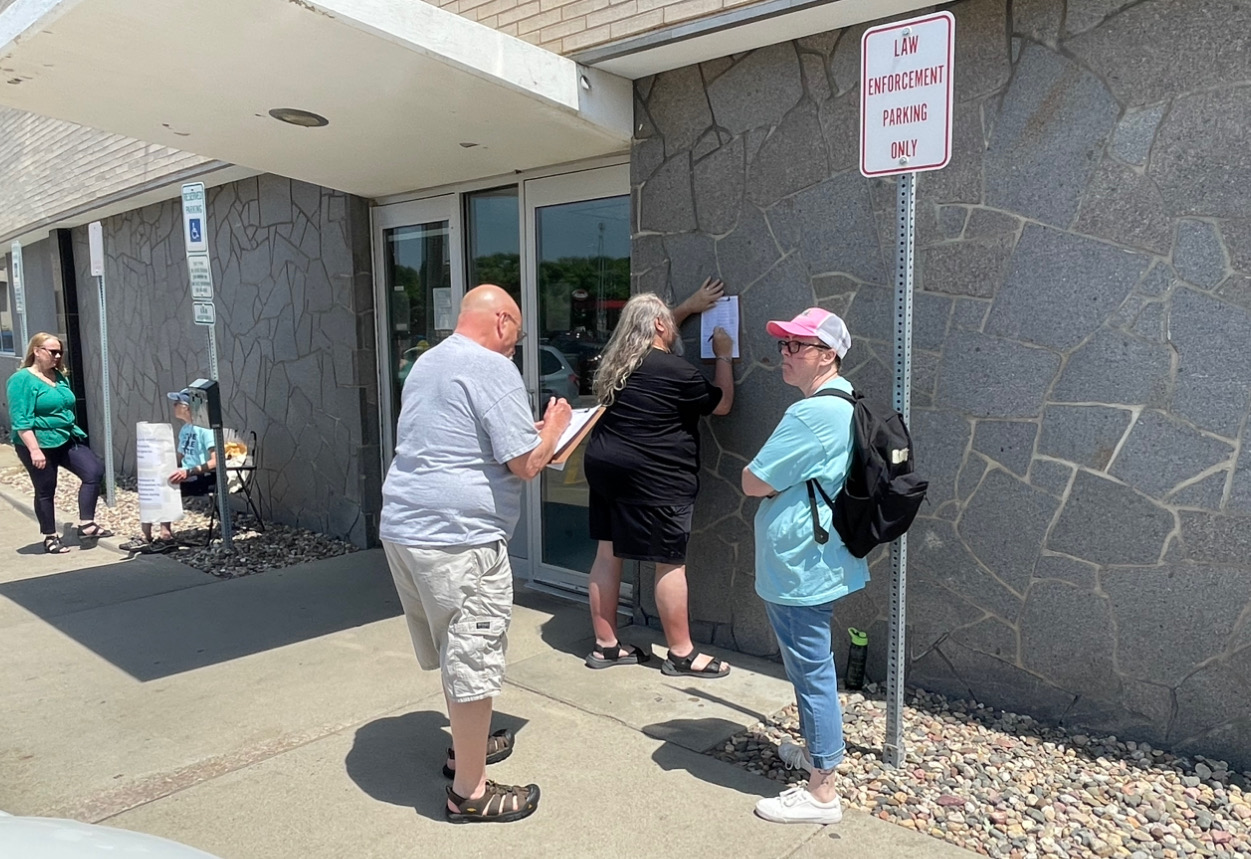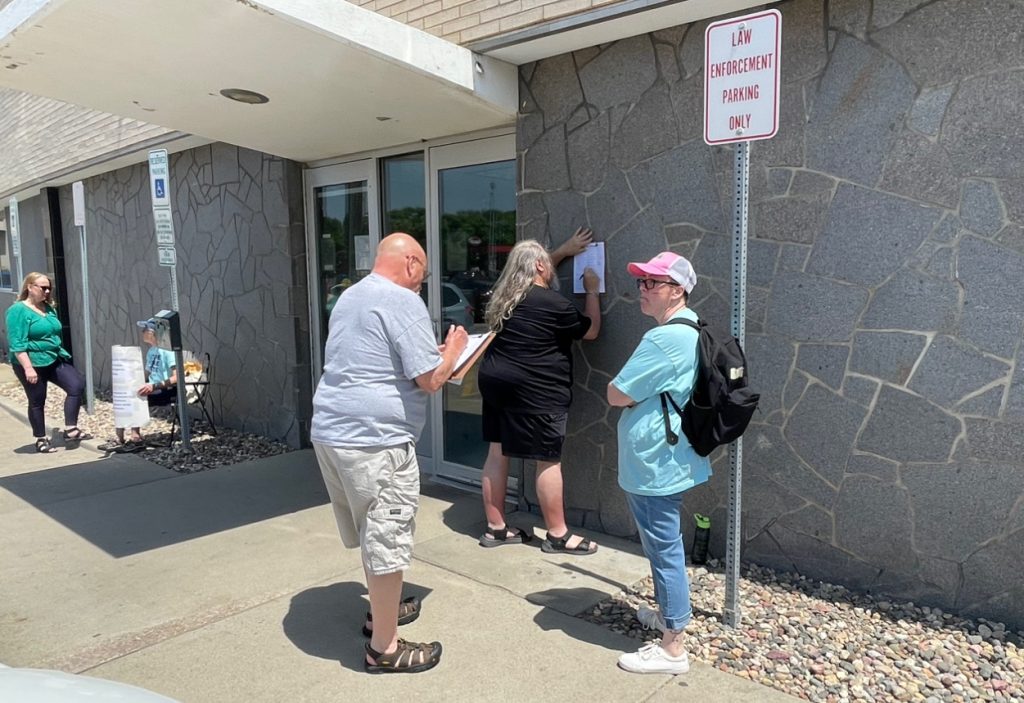UNDATED – Support for a 2024 ballot amendment that would enshrine abortion rights in the state constitution is growing, reflected by a nearly 20-point margin between residents who said they are for the measure and those who oppose it, according to a scientific poll co-sponsored by South Dakota News Watch.
The statewide survey of 500 registered voters, also sponsored by the Chiesman Center for Democracy at the University of South Dakota, showed that 53% of respondents support Constitutional Amendment G. If passed, it would reverse a state abortion ban enacted when the U.S. Supreme Court overturned Roe v. Wade. The measure is opposed by 35% of those polled, with 11% undecided.
That’s a big swing from a News Watch poll conducted in November 2023, when 46% of respondents said they were for the measure and 44% were against it.
Perhaps most notable is the fact that 46% of Republicans polled in the most recent survey said they support codifying legal abortion in South Dakota, with 41% opposed and 14% undecided.
Rick Weiland, co-founder of Dakotans for Health, a grassroots organization sponsoring the amendment, said the poll indicates more people are paying attention to an issue seen as one of the key dividing lines in 2024 national and state elections.
“I really believe that more people are tuning in to this,” said Weiland, a former Democratic U.S. House and Senate candidate. “(South Dakota) is operating under one of the most extreme abortion bans in the country, and there’s been a backlash. People want common-sense reproductive health care options in a state where that freedom has been taken away.”
The co-founders of Life Defense Fund, an anti-abortion group formed to provide organized opposition to the amendment, said in a statement to News Watch that more information will lead to shifting opinions on the issue.
“The devil is in the details, and the more people learn that this extreme amendment approves late-term abortion and bans physical health protections for mothers, the more they will reject it,” Republican state legislator Jon Hansen and longtime anti-abortion advocate Leslee Unruh said in the statement.
‘Complex or confusing language’
Mason-Dixon Polling and Strategy conducted the survey May 10-13. Those interviewed were selected randomly from a telephone-matched state voter registration list that included both landline and cellphone numbers.
Quotas were assigned to reflect voter registration by county. The margin of error is plus or minus 4.5 percentage points.
South Dakota is currently under a 2005 state trigger law activated in June 2022, when the Supreme Court left it up to states to determine reproductive rights with its ruling in Dobbs v. Jackson Women’s Health Organization.
The law makes it a Class 6 felony for anyone “who administers to any pregnant female or prescribes or procures for any pregnant female” a means for an abortion, except to save the life of the mother. South Dakota is one of 10 states that has banned abortion and does not include exceptions for rape and incest.
The constitutional amendment would prevent the state from regulating abortions during the first trimester (0-13 weeks). During the second trimester (14-26 weeks), the state could regulate the abortion decision, but any regulation must be reasonably related to the physical health of the mother. During the third trimester (27-40 weeks), abortion could be prohibited except if it is necessary to preserve the life or health of the pregnant woman, according to her physician.
The fact that 11% of respondents are still undecided on such a prominent issue could be a sign that voters have questions about specifics of the proposal, said Julia Hellwege, an associate political science professor at USD and incoming director of the Chiesman Center.
“Finding compromise on abortion access rather than strict laws in either direction can make for complex or confusing language,” said Hellwege. “For a lot of people as the campaign progresses, the details will matter.”
‘Closely aligned’ with Roe v. Wade
Rep. Hansen has cited a lack of “safety protections” in the amendment such as parental notification, waiting periods and informed consent, adding that the measure’s language is “far more extreme than Roe v. Wade itself.”
Weiland and others pushed back on that statement by saying the amendment uses the same trimester framework as Roe, the landmark 1973 ruling in which the Supreme Court held that the Constitution protected a woman’s right to an abortion prior to the viability of the fetus.
In South Dakota, before Dobbs and the trigger law, informed consent meant that doctors were required to tell patients that women who undergo abortion procedures could experience depression and suicidal thoughts and that the procedure would “terminate the life of a whole, separate, unique, living human being.”
These state restrictions were not permissible under Roe v. Wade.
They were passed after Planned Parenthood v. Casey, a 1992 Supreme Court ruling that upheld the basic tenets of Roe but overturned the trimester framework and used a more flexible standard as to whether state-imposed restrictions were constitutional.
Based on this, supporters can be taken literally when they say South Dakota’s abortion amendment is an attempt to codify Roe v. Wade, according to Hannah Haksgaard, a professor at the USD School of Law.
“The proposed amendment is very closely aligned with the original Roe v. Wade framework,” Haksgaard told News Watch in 2023. “The language mimics the trimester framework of Roe v. Wade and nothing in this amendment indicates any abortion rights more extreme than that.”
Data show late-term abortions are rare
Hansen also contends that the amendment, if passed, would allow abortions “up to nine months” because of the measure’s language. After the second trimester, the state would be permitted to prohibit abortion except in cases when a doctor determines it is necessary “to preserve the life or health of the pregnant woman.”
Hansen said that the words “or health” could include mental health, “however severe or however mild,” and that “preserve” means to keep something as it is.
“So the abortion amendment isn’t even about abortion to relieve existing mental health issues,” he wrote on X (formerly Twitter). “The abortion amendment legalizes late-term abortion up to the point of birth if the stated reason is to avoid stress, anxiety, or adjustment issues, however mild, even before these issues ever occur.”
Most states with health exceptions limit those exceptions to physical health concerns such as “serious risk of substantial and irreversible impairment of a major bodily function” (Arizona, Florida, Ohio, Wyoming, Indiana) or risk of “serious, permanent impairment of a life-sustaining organ” (Kentucky and Louisiana).
No such declaration exists with the proposed amendment in South Dakota, keeping in line with the original Roe wording. Hansen and other anti-abortion advocates view that as problematic.
“We cannot allow abortion through nine months of pregnancy to be written into our state’s founding document,” Hansen said in a video on the Life Defense Fund website. “The results would be completely devastating to life in our state.”
Weiland calls that interpretation a “scare tactic” and notes that late-term procedures occur in very rare circumstances in states where abortion is legal.
Fewer than 1% of U.S. abortions in 2020 took place at 21 weeks or later, compared to 93% up to 13 weeks and 6% at 14-20 weeks, according to abortion surveillance data from the Centers for Disease Control and Prevention.
Men, women show similar support
There was not much difference between the attitudes of men and women in the most recent poll, with male voters supporting the abortion measure by a margin of 54% to 36% and women supporting it 53% to 35%.
The November 2023 survey showed just 41% of women supporting the measure compared to 50% opposed. Men were in favor by a margin of 51% to 37%.
Weiland said stakes have been raised for South Dakota women because of the 2024 presidential election and the Supreme Court weighing a case involving the accessibility of mifepristone, the primary drug used for medication abortions.
News Watch has reported that several hundred South Dakota residents have traveled to Minnesota for online consultations and prescriptions to terminate pregnancies since South Dakota’s ban went into effect. A crackdown on mail-order abortion pills could close another door for those seeking reproductive health care.
“This is a state that prides itself on touting its freedom and that people should come here to enjoy those freedoms,” said Weiland. “When it comes to being a woman, though, they’ve had 50 years of reproductive health care freedom taken away from them, and I think that resonates with the majority of people.”
Abortion on ballot in other states
Life Defense Fund has worked tirelessly to try to keep the measure from reaching the November ballot, mindful of a national trend of progressive groups using the initiative process to gain ground on abortion rights.
Election wins have come in conservative states such as Ohio, where 57% of voters approved a constitutional amendment in November 2023 that ensured access to abortion and other forms of reproductive health care.
In Kansas, voters overwhelmingly rejected a 2022 constitutional amendment that would have allowed the Republican-led Legislature to tighten restrictions or ban abortion outright, with 59% voting against the amendment.
This year, abortion rights are slated to be on the November ballot in Arizona, Florida, Nevada, Colorado and Nebraska, with petition efforts still under way in a number of other states.
In South Dakota, voters have a track record of rejecting near-total abortion bans at the ballot box.
In 2006, the Legislature passed a law to ban all abortions except those done to save the life of a pregnant woman. The measure was signed by then-Gov. Mike Rounds, but opponents gathered enough signatures to refer it to the ballot, where it was defeated with more than 55% percent of the vote.
Two years later, voters rejected by a margin of 55% to 45% a ballot initiative that would have banned all abortions in the state except in cases of rape or incest or “to preserve the health or life of the woman.”
Certification challenge expected
Dakotans for Health petition circulators occasionally clashed with anti-abortion demonstrators and reached a settlement with Minnehaha County over public access during the signature gathering process.
The group’s friction with Hansen and the Life Defense Fund spilled over into the ballot certification process.
On May 16, South Dakota Secretary of State Monae Johnson’s office certified the measure for the Nov. 5 ballot as Amendment G, saying that a random sample showed 46,098 signatures were deemed valid, well over the threshold of 35,017.
Hansen formed a campaign finance committee called South Dakota Petition Integrity that contacted petition signers by phone, asking if they wanted to revoke their signature as allowed by a Hansen-sponsored state law passed this year by the Legislature.
Complaints from call recipients led Johnson to alert law enforcement about a phone scam from callers “claiming they are with the Secretary of State’s office” and “trying to pressure voters into asking that their name be removed from the Abortion Rights petitions.”
Hansen denied that callers had claimed to represent the secretary of state’s office, and Attorney General Marty Jackley declined to press charges.
But Weiland pointed to the episode as proof of “desperate measures” being used by abortion opponents to try to keep the measure off the ballot.
Hansen has said his group will file a challenge to the certification and that he expects the matter to end up in court. The deadline to file a challenge is June 17.
“We are continuing to review the signatures and will announce a challenge at the appropriate time,” Hansen told News Watch.
Young voters supportive of measure
The News Watch/Chiesman poll showed young voters to be most supportive of Amendment G, with 57% of respondents ages 18-34 saying they are for the measure, compared to 39% against. Only one of the age groups (50-64) registered less than majority support, with 49% for the measure and 40% opposed.
Geographically, the most support came from the East River/North region, including cities such as Aberdeen, Brookings and Watertown, with 57% of respondents supporting the measure. That was followed by Sioux Falls Metro at 53% and East River/South and West River both at 52%.
Based on presidential preference for 2024, respondents who said they preferred Democratic President Joe Biden supported the abortion amendment 61% to 28%. Registered voters who support Republican nominee Donald Trump were 53% for the amendment and 42% against it.
Nationally, according to the Pew Research Center, 63% of Americans have said that abortion should be legal in all or most cases, while 36% said it should be illegal in all or most cases.
“(Anti-abortion) factions have been very organized and cohesive through the years, with very little compromise on this issue,” said Hellwege. “But public attitudes haven’t always been as unyielding, which could explain some of the numbers in this poll.”












